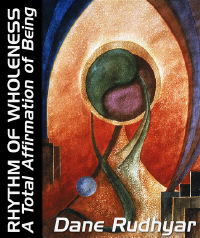 |
| Home | Bio | Art | Music | Literature | Civilization & Culture | Philosophy of Wholeness | Theosophy & Spirituality | Astrology |

RHYTHM OF WHOLENESS A Total Affirmation of Being by Dane Rudhyar, 1983 CONTENTS PROLOGUE PART ONE The Philosophy of Operative Wholeness 1. Prelude to a New Interpretation of Reality Page 1 Page 2 Page 3 Page 4 Page 5 Page 6 2. The Search for Spiritual Security: The One, the Whole, and Wholeness 3. The Movement of Wholeness PART TWO The Cycle of Being 4. The Structure of the Cycle of Being 5. The Four Crucial Phases of the Cycle of Being 6. The Inevitability of Success and Failure 7. Spirit and Mind PART THREE The Cycle of Man 8. Constitution of Man - The Physical and Psychic Bodies 9. Constitution of Man - The Spiritual Entity and the Higher Mind 10. The Structure and Transformation of the Total Person 11. The Cyclic Process of Spiritual Embodiment PART FOUR In The Spirit of Wholeness 12. The Principle of Holarchy and the Interplay of Horizontal and Vertical Relationships 13. Transpersonal Activity versus Mediumship 14. Rites of Passage EPILOGUE |

CHAPTER ONE
Prelude to a New Interpretation of Reality - 5 The European Renaissance revived something of the classical Greece spirit that had flourished two thousand years before. Unfortunately the revival came as a rather passionate reaction against the theological dogmatism of the Catholic Church, which was still very strong and armed with the power of the Inquisition. Because the Church considered the human soul and spiritual experiences as its exclusive domain, the scientific spirit of research and analysis had to concentrate upon the objective material world and the multiplicity of physical entities it could reduce to ever simpler elementary units. For nearly four centuries, empiricism (Francis Bacon), intellectual rationalism and mechanism (Descartes, Newton, et al.), and tremendous technological achievements came to dominate the West. Yet the latter derive from an exclusivistic scientific methodology, a materialistic individualism driven by the desire for physical comfort and personal independence at all costs, and an egocentric passion for profit, power, and expansion. Western civilization has spread its individualism all over the globe, and as a result the whole of mankind has reached a critical, potentially disastrous turning point. Individualism itself has to be transformed. Individualism was given a universalistic and absolute meaning and interpretation by the sages of the Upanishad era and a rationalistic and ethical character by Gautama and the great minds of the sixth and fifth centuries B.C. In seventeenth- and eighteenth-century Europe, it acquired an empirical, materialistic, and political basis which led to the triumph of an ego-glorifying Western society. Christianity attempted to reinterpret individualism through divine love (agape); so did Mahayana Buddhism through the superhuman compassion (karuna) of the Boddhisattva ideal. Both attempts have led to many outstanding results, but both have become mired in dogmatism and a rigidly procedural, formula-worshipping mentality, which (at least in the past) has been misused to acquire political power. Now this individualism has once more to be reinterpreted and transfigured. A relatively new philosophical mind must be developed, free from both scientific and religious prejudice. The deification of "the Individual" and the supreme One, isolated in His super-rational absoluteness, must go, as well as the irrational randomness of an infinitely extended material universe reducible to infinitely small and incomprehensible units. I speak of this new mind as the "mind of Wholeness." The trend toward the development of such a mind has been noticeable since the last decades of the nineteenth century, and especially since the first world war. Philosophically, this trend is centered around the persistent use of the terms whole and holistic, terms which keep recurring years after the publication of the now largely forgotten book Holism and Evolution (1926) by the South African statesman-philosopher Jan Smuts.(6) Since the term holism became fashionable in "progressive" circles, however, it has been used so carelessly that it has lost much of its meaning and correct impact. Moreover, Smut's concept of holism was so limited that it led to a typically Western glorification of what he (and C. G. Jung) called personality — to him the supreme achievement of evolution.(7) Therefore, the concept of whole has to be broadened and universalized — more so indeed than recent philosopher-scientists interpreting the universe as a hierarchy of wholes (or systems) are able and willing to do. What is needed is to transfer the mind's attention and power of concentration from the image-concept of "the One" to that of "the Whole" and, even more, to Wholeness. Such a transfer implies a fundamental change in metaphysical outlook and in the value given to religious movements and institutions. During the last four millennia, metaphysics has glorified the process of individualization and given it a quasi-absolute, often divine meaning by referring it to "the One." Religions have presented images of an utterly transcendent God, indeed one who is external to a universe He created "out of nothing" for no humanly conceivable reasons — or for such an obviously anthropomorphic purpose as "self-expression." The value of these ideas and formulations is in no way denied in this book; it is, however, seen as relative. 6. Smuts was influential in formulating the ideals which President Wilson and a few other visionaries tried to embody in the League of Nations (1920). His total repudiation by the South African nation was as tragic as Wilson's repudiation by the American people. Return 7. By personality Smuts and Jung meant something entirely different from the meaning the word has in theosophic and "esoteric" teachings. More recent writers speaking of the full development of the human potential have used the word personhood to avoid ambiguity. In medieval theology, God alone had "personality." For Smuts and Jung, no evolutionary stages stood between the fully developed human person (personality) and God. Return By permission of Leyla Rudhyar Hill Copyright © 1983 by Dane Rudhyar All Rights Reserved.  Web design and all data, text and graphics appearing on this site are protected by US and International Copyright and are not to be reproduced, distributed, circulated, offered for sale, or given away, in any form, by any means, electronic or conventional. See Notices for full copyright statement and conditions of use. Web design copyright © 2000-2004 by Michael R. Meyer. All Rights Reserved. |
 |